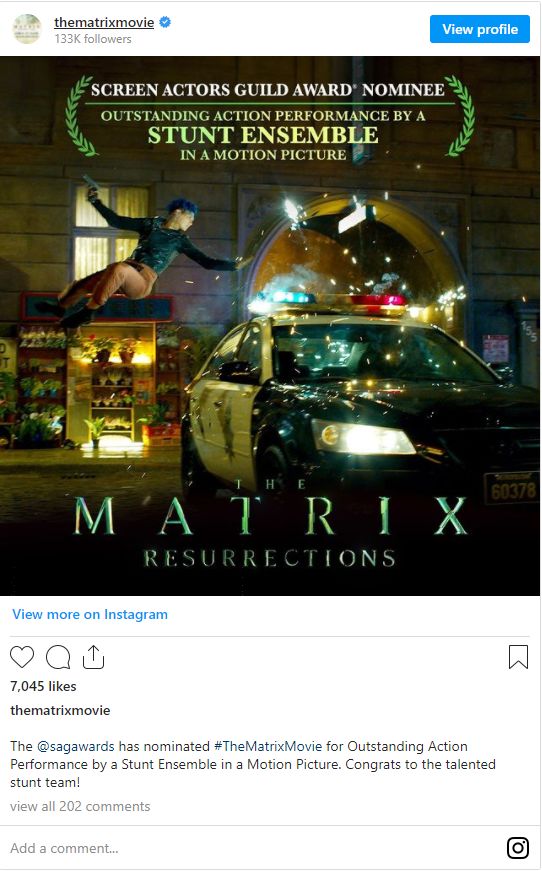HELLO, HOLLYWOOD
In this article, we'll be looking at Hollywood and the world of films, in particular, issues surrounding the film The Matrix Resurrections. We'll be discussing both commercial and IP issues.
TROUBLE BEHIND THE SCENES
The complaint
The Matrix Resurrections was released in 2021. A dispute has now arisen between the company behind the film, Warner Bros Pictures, and a company that co-financed the film, Village Roadshow Pictures.
Village Roadshow's complaint is that Warner Bros breached the co-financing agreement by releasing the film simultaneously in cinemas and on Warner Bros' streaming service, HBO Max. The significance of this is that, although Village Roadshow receives a share of the box office income, it does not receive any share of streaming income, which means that its revenue is significantly reduced. Village Roadshow is very upset that Warner Bros did this without any consultation. Village Roadshow even goes on to suggest that Warner Bros deliberately sabotaged the film's cinema release in order to prop up HBO Max.
Unfairness
Village Roadshow argues that the release should have been "consistent with customary practices in the motion picture industry," and that a 90-day period before streaming is the norm. Village Roadshow is particularly upset about the fact that, although Warner Bros did not even bother to engage with it about the decision to go for a simultaneous release, it did manage to reach "acceptable accommodations" with various other parties whose income was also linked to box office revenue, namely the film's director and two of the film's stars, Keanu Reeves and Carrie-Anne Moss. Perhaps most galling for Village Roadshow, was the fact Warner Bros even managed to reach an agreement with another co-financier of the film, a company called Legendary.
Don't blame COVID-19
Possibly in an attempt to pre-empt any "COVID-19 excuses everything" argument, Village Roadshow claims that Warner Bros cannot use the pandemic as an excuse for this form of release. It points out that other recent cinema releases have been successful – the film Spider Man: No Way Home is cited as an example.
The counter
Warner Bros' response to the claim is that it never promised that The Matrix Resurrections would only be in cinemas: "an exclusive theatrical release was not part of the bargain." The film company further claims that Village Roadshow still owes it USD112.5-million in production expenses. Warner Bros contends that Village Roadshow should follow the arbitration procedure that's set out in the agreement.
Not the first time
Apparently, this kind of thing is not unprecedented. There was a recent case where the actress Scarlett Johansson sued the film company Disney for releasing the film Black Widow on Disney Plus very early, thereby sacrificing box office receipts and reducing Johansson's income. This matter was apparently settled by way of a payment to the actress.
SOME COMMERCIAL ASPECTS
Commercially astute?
There's clearly a great deal of money involved with films, which does suggest that the parties involved in this field need to be commercially astute. Yet, aspects of the story surrounding The Matrix Resurrections do suggest that this may not always be the case.
Co-financing
Take the issue of the co-financing of films, for example. Does a company that puts up a portion of the required capital always only acquire the right to share in cinema receipts (as opposed to streaming rights for example) and, if so, why should this be? Do agreements between film companies and financiers clearly specify just how a film will be released, given that a simultaneous release could have a major impact on the financier's earnings? Does a company that puts up a portion of the required capital acquire a share of the copyright?
A FEW WORDS ON IP RIGHTS
Copyright
The most obvious form of IP involved in films is, of course, copyright. In South Africa, a cinematograph film (as it is called in the South African copyright legislation) is one of a number of categories of works that enjoys copyright protection. The copyright belongs in the first instance to the company that produces the film, and it lasts for a period of 50 years from the date of release. The right comprises the exclusive right to reproduce the film, show the film in public, broadcast the film, adapt the film, and sell or let copies of the film. As for ownership, the first owner of the copyright is the person who made the arrangements for the making of the film.
Trade marks
Trade mark law might also be relevant. The name of the film may enjoy trade mark protection, as might visual material associated with the film, and perhaps even catchphrases. Trade mark law is, of course, particularly relevant when it comes to the merchandising that is associated with a film.
The content of this article is intended to provide a general guide to the subject matter. Specialist advice should be sought about your specific circumstances.


